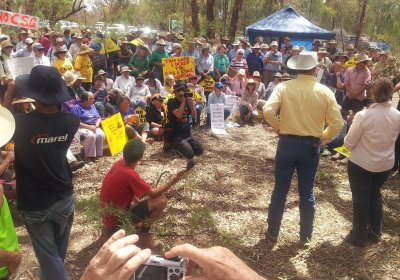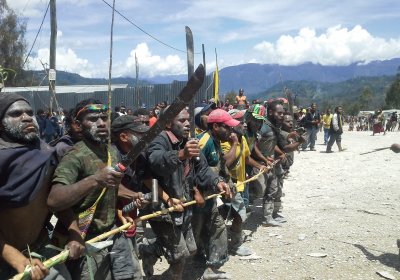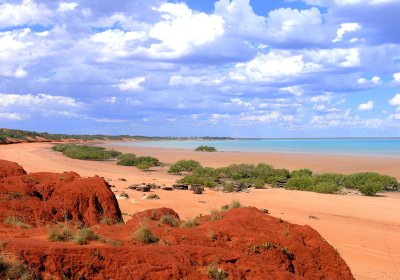John Fenton is a farmer from Wyoming in the United States who has 24 gas wells on his property. He recently toured Australia to speak about the environmental and health impacts the gas industry has had on his land and community.
He spoke at 11 meetings in gas hotspots throughout Queensland, New South Wales and Victoria, organised by the Greens and Lock the Gate Alliance. These meetings were well attended. In Narrabri, in northern New South Wales, 600 people came to hear him speak.
Mining
The Socialist Alliance Victoria released this statement on March 2.
***
The mine fire that has been burning since February 9 is an immediate and serious threat to the health of residents in Morwell and other towns near the Hazelwood mine.
Immediate health threats include: elevated levels of carbon monoxide, a toxic gas; fine particulate pollution in the PM2.5 and PM10 size range; ash fallout over the area, potentially containing many toxic compounds; carcinogenic compounds in ash and particulates.
NSW Mining has sponsored a radio competition on one of Sydney’s top-rated breakfast shows, in which a listener has the chance to win $1 million if they register to be a “miner”.
The promotional poster for the competition, which features hosts Amanda Keller and Brendan Jones wearing miners’ hard hats, carries the slogan: “NSW Mining. Good for jobs. Good for Sydney’s economy.”
When registering, participants have the option to receive more information from NSW Mining.
Violent clashes have once again erupted between local people, police and company security guards at the giant Porgera gold and silver mine in Papua New Guinea's highlands, operated and largely owned by the Canadian corporation Barrick Gold – the world's biggest gold mining company.
Continuing New Zealand’s proud history of protests at sea, attempts by Texan oil giant Andarko to start deep-sea oil drilling are being blocked by a tiny sailing boat.
Thousands came out to NZ's west coast beaches on November 23 to support the Oil Free Flotilla in its stand against Anadarko. More than 1000 gathered for the main event at West Auckland's iconic Piha beach, carrying colourful home-made banners with messages such as "We love our beaches", "No drill, no spill" and "Anadarko go home".
The Western Australian government has finalised its acquisition of land in the Kimberley for future development, despite long-standing opposition from environmentalists and the local Aboriginal community.
The 3414 hectares of land near James Price Point — part of one of the most ecologically opulent and pristine stretches of land left in the world — north of Broome, was bought from traditional landowners as “unallocated crown land.”
The area is now under management of LandCorp and the Broome Port Authority.
Canada's colonial past is its present, too, however much Prime Minister Stephen Harper seeks to obfuscate the reality of the history of this land.
Recent events have served as a prime example of how denial of past colonialism helps to perpetuate ongoing colonial relationships. The flash point is the small town of Rexton, New Brunswick, on Canada's east coast.
The growing resistance to fracking — the “hydraulic fracturing” of deep level shale rocks to extract natural gas — promises to reignite the climate movement after the failure of United Nations climate talks in 2009.
A feature of the recent march and blockades at Cuadrilla Resources’ drilling site near Balcombe in West Sussex was the diversity of the people involved, as well as the numbers. Local residents were central to the protests, as they have been at Fylde, near Blackpool, where two Cuadrilla fracking operations led to minor earthquakes.
First Nations people have blockaded motorways on October 17 in Rexton, New Brunswick in Canada's west in protest against the violation of their traditional homelands by colonist mining companies seeking to commence fracking for shale gas.
Protsters from the Elsipogtog First Nation were joined by other local residents to stop shale gas exploration over fears it would lead to environmentally damaging fracking processes.
The Peruvian government has renewed its commitment to several controversial mining mega-projects. The projects have provoked huge regional protests against the environmentally destructive expansion plans of foreign mining corporations.
Speaking at a mining industry conference held in the southern city of Arequipa on September 16, Minister of Energy and Mines Jorge Merino indicated that Conga (in Cajamarca), Tia Maria (in Arequipa) and Corani (in Puno) will be developed with the backing of President Ollanta Humala's administration.
One of the more disturbing images on federal election night was that of Coalition MP-elect Barnaby Joyce welcoming mining magnate Gina Rinehart as the special guest to his election party. Few things could reveal more clearly the strong connection between corporate power and government under Coalition rule.
It is worth noting some of the policies that Rinehart is promoting for the Northern Territory because, let’s face it, they are likely to happen.
One of her big ideas, which Kevin Rudd adopted before his election defeat, is the creation of a northern Australia tax haven.
One of Prime Minister Tony Abbott’s first acts has been to abolish the Climate Commission. Set up under Julia Gillard in 2011 and chaired by Tim Flannery, the commission’s role was to explain climate science to the public.
It is well known Abbott will abolish the carbon price, but other climate programs in Abbott’s sights include the Climate Change Authority and the Clean Energy Finance Corporation.
This is a clear sign the new Abbott government believes the environment can be sacrificed for profit.
- Previous page
- Page 28
- Next page








